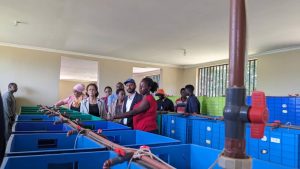On April 2nd, 2024, special visitors from the World Food Program (WFP) visited the Aquaculture unit in the Department of Model Training Farm, part of the College of Agriculture at Sokoine University of Agriculture. The purpose of the visit was to learn and see the best fish farming practices adopted at the Aquaculture unit as a means to enhance food security.
 Visitors were impressed by Azolla production, which is an alternative low-cost feed, fingerlings production systems (Nile tilapia and Catfish hatcheries), farmed Black Soldier Flies and red worms’, and fancy systems like the Recirculating Aquaculture System (RAS) and aquaponics system. Moreover, visitors witnessed BSc. Aquaculture second-year students learning hands-on skills in fish farming as part of their Field Practical Training.
Visitors were impressed by Azolla production, which is an alternative low-cost feed, fingerlings production systems (Nile tilapia and Catfish hatcheries), farmed Black Soldier Flies and red worms’, and fancy systems like the Recirculating Aquaculture System (RAS) and aquaponics system. Moreover, visitors witnessed BSc. Aquaculture second-year students learning hands-on skills in fish farming as part of their Field Practical Training.
The World Food Programme (WFP) has been in Tanzania since 1963, working with the Government, donors, other UN agencies, NGOs and the private sector to improve the food security and nutrition of vulnerable populations.
In line with its commitment to the 2030 Agenda, WFP’s Country Strategic Plan 2022-2027 targets inclusive economic growth through market-based interventions (such as financial inclusion and commodity marketing digital solutions), strengthened human capital, increased access to affordable nutritious foods and healthy diets, and climate action. Under the plan, WFP is expanding its operations across more regions in Tanzania’s mainland and Zanzibar, while increasing its focus on youth, women, and people with disabilities.




